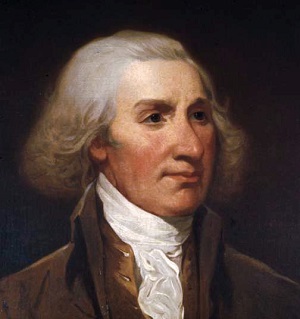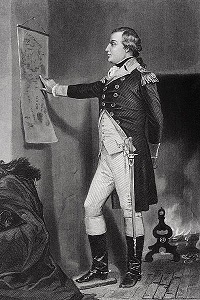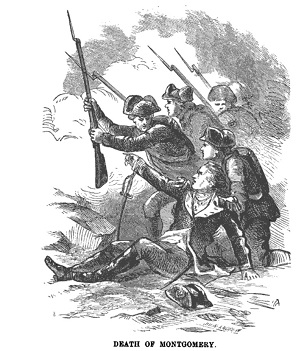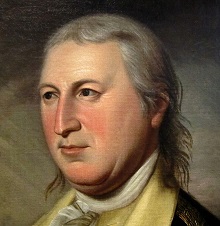Benedict Arnold: Page 2

General Philip Schuyler
Jacob H. Lazarus, 1881
The Canadian invasion plans were still in the works and George Washington proposed to the Continental Congress that Benedict Arnold should participate in the campaign under the command of General Philip Schuyler. Arnold and his men left Cambridge for the attack on Quebec in September, 1775, marching north through rough wilderness with winter approaching. The weather was cold, the terrain was difficult and water and other supplies were limited. Arnold drafted a letter to John Dyer Mercier, an aquaintance in Quebec, hoping to gain useful intelligence before he and Schuyler arrived to besiege the city. The letter was given to Eneas and Sabatis, natives of the Abenaki tribe, and a French-speaking British deserter named John Hall, to deliver to Mercier. Instead, the letter fell into the hands of the British, who, now alerted to the impending assault, buttressed the city's defenses.
Some of Arnold's men deserted during the arduous wilderness trek, taking much-needed supplies with them. Others died along route from disease and exposure. Six hundred men remained when they finally reached the St. Lawrence in November.
A rainstorm prevented any movement for three days and in the interim, the intercepted letter allowed the British to bring reinforcements to the city. Arnold and his men were themselves reinforced by General Richard Montgomery, and about 300 men. On December 31, 1775 the battle ensued, but things went poorly for the Americans. Montgomery was killed and Benedict Arnold was wounded with a bullet in his leg. Daniel Morgan was forced to take over and did so fiercely, but eventually the Americans were forced to surrender. Arnold was in command and refused to end the siege, bellowing orders from his sickbed. He did not want to leave unless he was triumphant. He requested reinforcements which he received only in small amounts. He was given high praise by Washington and others and made a Brigadier General.
Arnold withdrew to Montreal, which was firmly in American hands. He led an expedition to recapture a nearby fort on the northern side of the St. Lawrence River known as The Cedars, which had recently fallen into enemy hands, with 500 Americans taken captive. Arnold eventually agreed to a prisoner exchange, turning over captured British troops in exchange for the American prisoners, and returned to Montreal. There he received a delegation of members of Congress who determined that taking Quebec was all but impossible, and it might not be feasable to hold onto Montreal. British reinforcements had recently arrived, and the Americans were ravaged by smallpox. Arnold and the rest of the Americans eventually abandoned Montreal and retreated south.
Benedict Arnold's summer battles of 1776 involved legal matters, not tactical warfare. Arnold became involved in a dispute with Moses Hazen, an officer under his command, whom he accused of insubordination for failing to carry out Arnold's orders to seize supplies from Merchants in Montreal during the American army's retreat. Hazen issued counter-charges against Arnold for issuing the order to plunder in the first place. Hazen was aquitted at his court-martial, and Arnold was ordered to apologize, an order he indignantly refused. General Horatio Gates intervened on behalf of Arnold, who was given charge of a small fleet of ships and ordered to Ticonderoga.
Here again, Arnold was successful, but found his critics willing to point fingers and pass blame. The Americans lost ten of their fifteen ships and Arnold was blamed. While not a victory, the battle showed the British the stamina and tenacity the Americans had.
The following winter was trying for Arnold. Some of his old Army nemeses rose up once more to bring charges against him. He spent most of the winter defending himself. He saw a number of junior officers receive promotions to Major General, while he remained a Brigadier. Here again, political machinations, robbed him of his due, he felt. Washington was upset over the situation and spent time trying to calm his friend and find out what happened in Congress, and why he was not consulted about the promotions.






